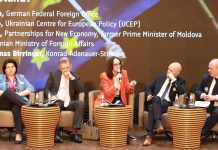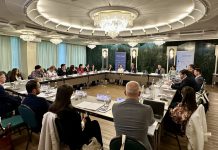On March 19, Foreign Policy Association of Moldova with the support of Visegrad Insight and the Black Sea Trust for Regional Cooperation a project of the German Marshal Fund, conducted an online debate entitled “Eastern Partnership Scenario 2030: Moldova at the Crossroads”. The distinguished invited speakers were Wojciech Przybylski, editor-in-chief of Visegrad Insight and President of the Board at the Res Publica Foundation; Natalia Stercul, program director of the Foreign Policy Association; Iulian Groza, executive director of the Institute for European Policy and Reforms; and Dionis Cenusa, researcher at the Institut für Politikwissenschaft, Justus-Liebig-University (Giessen, Germany). The debate was moderated by Victor Chirila, executive director of the Foreign Policy Association.
At the start of the debate, W. Przybylski revised the report “Eastern European Futures: Four Scenarios for the Eastern Partnership 2030”. According to him the process of the European and Transatlantic integration “has been shaking”, so there is no clarity of what is going to happen in the next decade. W. Przybylski stated that the main goal of the work was to look at the most possible outcomes and trends and transform them in scenarios, calling it a civil society effort to make public debate better informed. Four scenarios which are, according to the speaker, still valid after COVID-19 pandemic, are: Pragmatic Integration; Russian Hegemony Revisited; EU Pivot to Moscow; and Civil Emancipation. The expert also mentioned that further integration may be slowed down by the fact that some countries from Eastern Partnership (EaP) are obviously ahead of others, while Russia also remains a disturbing factor, even though it is troubled politically and economically. According to W. Przybylski “the world is in need for democracy”, and the last years showed the successfulness of democracy. Regarding the report the expert also mentioned that it was designed to help EU and EaP countries structure the discussion based on the proposed scenarios, but it should also be taken into consideration that there is certainly a possibility of emergence of some black swans. Overall, W. Przybylski claimed that these scenarios can help “prepare for the worse and work for the better”.
The executive director of IPRE, Iulian Groza, who promotes the idea of resetting the European integration process of the Republic of Moldova has mentioned that the general environment in Europe is changing, touching upon the issues regarding the next EaP summit. The main idea of the EaP is resilience, as the expressed stated. He also highlighted that the matter of security is more and more present in EU discussions and mentioned in this regard the trend of considering EU’s strategic autonomy. In the view of Mr. Groza the EU is trying to adapt to the new challenges and changing environment by paying more attention to the security issues, while also bringing up the EU pandemic relief programs and its help to EaP countries in this framework.
According to Mr. Groza, digitalization, green deal, and people-centric are currently the main concepts for the EaP. The expert also revealed the recent initiatives to create the network of think tanks on the Eastern Partnership as a proof that the EU is looking for their ideas. Russia is being considered as a challenge to further integration in the region by the speaker. In this regard Iulian Groza mentioned that all three countries (Moldova, Ukraine and Georgia) of the EaP are going thorough different challenges, but he is not in favor of the idea of reducing the number of EaP members to three. Thus, the expert states that all countries are affected by corruption, inefficient system of justice, and Kremlin-sponsored proxy politicians. Therefore, the main focus for EaP countries should be bringing up rule of law and effective institutions and cutting links external influence that represent threat to security and democracy.
The program director at APE, Natalia Stercul focused on Moldova-specific oriented scenarios, also stating at the beginning of her speech that “we must concentrate our attention on best practices”. The expert described each scenario in particular from Moldova perspective in the framework of the EaP Platform.
The Pragmatic Integration scenario, according to N. Stercul, represents specific interest for Moldova. Mentioning pandemic consequences, the speaker stressed out how important the help from EU is in this regard. Also, Ms. Stercul mentioned some Moldova-targeting EU programs, like the EU Agricultural Moldova Program, the Covid-19 Resilience Contract for Moldova and others, describing how beneficial collaboration with the EU is for Moldova.
The second scenario – Russian Hegemony Revisited, according to the expert, is the most pessimistic but a plausible one. She highlighted that Russia exercises its influence throughout Eastern Europe, taking into account ongoing war in Eastern Ukraine, dramatic landscape in Caucasus, Russian military presence in Karabakh, which represents the geopolitical victory of Russia, political crises in Georgia and Georgian anti-Russian protest, Russian support to Lukashenko’s regime in spite of the massive population protests, Russian military presence in Transnistria. The EU has to develop more clear position regarding Russia, as Natalia Stercul said.
Commenting on the third scenario – EU pivot to Moscow, N. Stercul stated that more close relations of EU with Russia will result in the period of instability. In case of Moldova increasing political influence from Russia is an issue. However, Russia is one of the main economic partners and its important for Moldova to develop relations with Russia in this field. Thus, the third scenario doesn’t give much hope to Moldova, because most political and socio-economic problems will remain unchanged.
The expert describes the fourth scenario – Civic Emancipation, as a more optimistic one which provides a lot of possibilities. “Civic activism is a very important part of democratic process, that’s why more attention should be paid to civic activism and solidarity” – said N. Stercul and stressed out that the EU should more involved EaP countries in the EU civic protection mechanism.
The researcher Dionis Cenusa, emphasized that there is a need to acknowledge that the EU doesn’t fully understand what approach it should have to the region. According to the speaker, Western Balkan and Eastern Europe are quite similar in many ways. Mr. Cenusa considers that the EU focused too much on stability and didn’t push enough for more rule of law reforms in these countries. According to him, the EU continues to make the same mistakes in the region. In his view, the EU has to extend the use of smart-conditionality for advancing the crucial rule of law and justice reform in the EaP countries. Moreover, he believes that the EU is focusing more on quantity and much less on quality of reforms. The expert considers that, if the Association Agreement is to be fulfilled, all the laws harmonized with the EU’s legislation must be also implemented.
According to the Mr. Cenusa the rule of law is a very general concept and we sometimes forget the people who are behind it, like judges, prosecutors, etc.. Therefore, the expert believes that any meaningful rule of law and justice reform must be preceded, first of all, by reforming, the institutions that are in charge with implementing those reforms. “We need to start from scratch”, he said.
The speaker also mentioned that Russia is still influential in the region, but Russian authorities have to rely more and more on hard power because Moscow is running out of soft power tools, while Brussels can implement soft power and diversify it. He expressed the opinion that the EaP member states should be given more feeling of participation in the EU decision-making process (like, for instance, becoming the observer states or joining some European institutions).
The expert also considers that EU should be much more visible in the region and has to undertake an honest communication about EaP’s accomplishment and mistakes. Mr. Cenusa mentioned that “we treat European integration as a holy cow”, stating that mistakes of the European integration should be discussed, and lessons should be learned from them. According to Mr. Cenusa, more critical thinking is needed in this domain as well.






